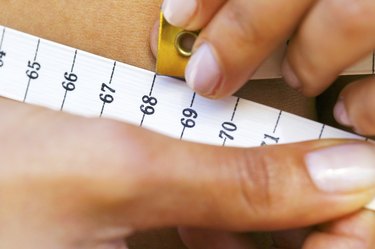
During weight loss, the body undergoes many changes, including changes to fat tissue, muscle tissue, bone mass and hormone levels. Rather than achieving weight loss by calorie reduction alone, addition of moderate physical activity and dietary emphasis of certain nutrients, such as protein, calcium and vitamin D, can help prevent the loss of muscle and bone during weight loss.
Body Fat Changes
Video of the Day
During weight loss, overall fat tissue is reduced, and the proportion of harmful belly fat to less-dangerous fat under the skin can also change for the better. A study published in "International Journal of Obesity" examined the effects of a six-month weight-loss program on the fat composition of men and women living with obesity. Researchers found that both men and women lost a greater proportion of intra-abdominal fat than subcutaneous fat. As intra-abdominal fat is strongly associated with metabolic disease, losing weight should also help reduce obesity-related health risks.
Video of the Day
Muscle and Bone Changes
Body composition changes during weight loss include not only reduction of fat, but also changes in bone and muscle. Diet-induced weight loss can result in loss of muscle mass, particularly in older adults. A 2009 study published in the "Journals of Gerontology" compared the effects of a diet-only to a diet-plus-exercise weight loss program on the body composition of older adults living with overweight. Results showed that while diet-induced weight loss significantly reduced muscle mass, inclusion of exercise helped prevent the loss of muscle during weight loss. Bone mineral density can also decrease during weight loss. In a 2009 study, University of Missouri researchers found that pre-menopausal women who lost modest amounts of weight also lost bone mass despite the addition of low-impact exercise.
Hormonal Changes
During weight loss and while maintaining a reduced weight, your body's levels of a fat-related hormone called leptin are reduced. Unfortunately, this hormonal change makes it difficult to keep the weight off, as the part of the brain that controls energy regulation will seek return to pre-weight loss leptin levels through increased feeding and reduced energy expenditure. A study published in "Journal of Clinical Investigation" in 2008 found that administration of leptin injections to individuals who had lost weight helped reverse increased hunger and decreased satiety that accompanies a weight-reduced state.
Impact of Nutrition
Nutrition can affect the body composition changes that take place during weight loss. Along with exercise, the right diet can also help encourage loss of fat over loss of other types of body mass during weight loss. A study appearing in the April 2010 issue of "Journal of the Federation of American Societies for Experimental Biology" observed that protein supplementation during a reduced-calorie weight loss program helped promote loss of fat over loss of fat-free body mass in older women living with obesity. Additionally, adequate intake of calcium and vitamin D can minimize the loss of bone density from weight loss.
Sudden Weight Loss
Safe and effective weight loss involves a gradual reduction of weight through either reduced caloric intake, increased physical activity or both. Attempts at sudden weight loss, brought about by starvation or crash diets, can cause unwanted changes in the body. Starvation actually causes your metabolism to slow down so it can conserve calories for survival. Severely restricted diets for sudden weight loss can also cause nutritional deficiencies which in turn can cause other undesirable effects, including hair loss.
- "International Journal of Obesity": Change in Intra-Abdominal Adipose Tissue Volume During Weight Loss in Obese Men and Women: Correlation Between Magnetic Resonance Imaging and Anthropometric Measurements
- "The Journals of Gerontology": Moderate Exercise Attenuates the Loss of Skeletal Muscle Mass that Occurs with Intentional Caloric-Reduced Weight Loss in Older, Overweight to Obese Adults
- "Applied Physiology, Nutrition and Metabolism": Serum Markers of Bone Turnover are Increased by Modest Weight Loss With or Without Weight-Bearing Exercise in Overweight Premenopausal Women
- "The Journal of Clinical Investigation": Leptin Reverses Weight Loss–Induced Changes in Regional Neural Activity Responses to Visual Food Stimuli
- "The FASEB Journal": Protein Supplementation During 6 mo Weight Loss Enhances Body Composition Changes in Older Women
- Science Daily: Weight-Bearing Exercise Does Not Prevent Increased Bone Turnover During Weight Loss